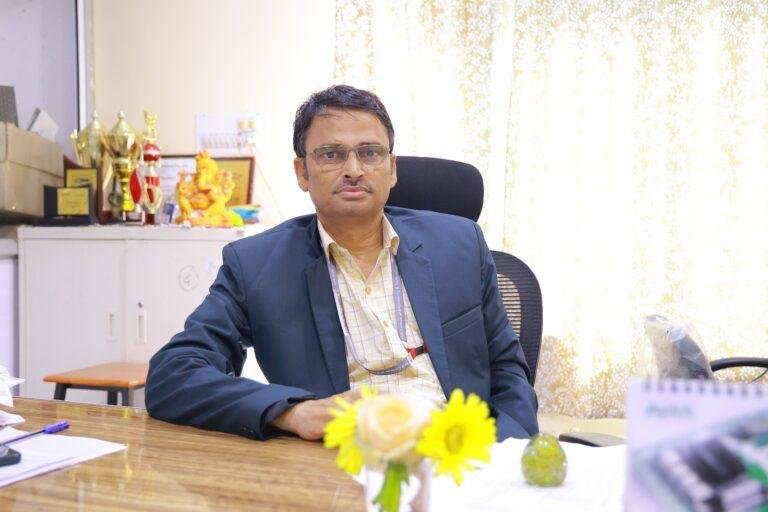Electronics & Communication Engineering
- Electronics & Communication Engineering
Electronics & Communication Engineering
About The Department

Dr. M. Mahesh
Head of the Department
Dr. M. Mahesh is a Professor and HOD in the Department of ECE, a distinguished academician with 22years of teaching experience. He pursued Masters from JNTU Hyderabad and Ph.D in the area of Image processing from JNTUA, Anantapur.
The Department of ECE was established in 2002 with an intake of 60 B.Tech students. Department has expanded steadily over the last few years, the department presently offers B. Tech.
The Electronics and Communication Engineering has been one of the key departments of the institute . Department of ECE comprises competent faculty members and with rich teaching, grooms the students to step into a bright career spanning across Hardware and Software Engineering with excellent laboratory facilities and highly qualified dedicated faculty, The department faculty is actively engaged in academic and research up gradations .The department has well experienced faculties, almost all faculties are enriched with NPTEL certifications among which 8 faculties has received Gold Medal certification they also have their publications in various SCI, Scopus and UGC indexed journals.
ECE Department has to its credit got approval of start-up research grant from SERB,DST an amount of Rs 13,46.400 to our professor Dr Girish Kumar.
The field of electronics and communication engineering has major contributions to the society which we are enjoying and witnessing today. The people across the world are able to connect in instantly because of fast growth in this field. This importance makes the Electronics and Communication Engineering branch to stay ever green on top of all other Engineering branches as well. A significant step taken by the government is establishing a semiconductor wafer fab manufacturing facility that drags employment in the areas of VLSI design. This course of engineering covers the major fields of electronics like Digital Signal Processing, Embedded Systems, VLSI Technology Design, microprocessor and Micro controllers, Microwave Engineering, RADARs, Digital Communication, Satellite Communication, and Mobile Communication apart from basic subjects.
- Vision
- MISSION
- P.O's
- PEO's
- PSO's
The Department endeavors to transform itself into a center of academic excellence in the field of Electronics & Communication Engineering thereby producing technically competent, confident, socially and ethically responsible engineers.
- Providing an environment that nurtures creativity that would build strong foundation for higher education and career advancement.
- Conducting interactive events that would bridge the gap between academics and industry which would make the students technically competent.
- Equipping students with essential employability skills like teamwork, problem solving and time management. While imparting ethical responsibility to make them self-reliant & globally recognized
A student will be able to
- Engineering Knowledge: Apply the knowledge of mathematics, science, engineering fundamentals, and an engineering specialization to the solution of complex engineering problems.
- Problem Analysis: Identify, formulate, review research literature, and analyse complex engineering problems reaching substantiated conclusions using first principles of mathematics, natural sciences, and engineering sciences.
- Design/Development of Solutions: Design solutions for complex engineering problems and design system components or processes that meet the specified needs with appropriate consideration for the public health and safety, and the cultural, societal, and environmental considerations.
- Conduct Investigations of Complex Problems: Use research-based knowledge and research methods including design of experiments, analysis and interpretation of data, and synthesis of the information to provide valid conclusions.
- Modern Tool Usage: Create, select, and apply appropriate techniques, resources, and modern engineering and IT tools including prediction and modelling to complex engineering activities with an understanding of the limitations.
- The Engineer and Society: Apply reasoning informed by the contextual knowledge to assess societal, health, safety, legal and cultural issues and the consequent responsibilities relevant to the professional engineering practice.
- Environment and Sustain ability: Understand the impact of the professional engineering solutions in societal and environmental contexts, and demonstrate the knowledge of, and need for sustainable development.
- Ethics: Apply ethical principles and commit to professional ethics and responsibilities and norms of the engineering practice.
- Individual and Team Work: Function effectively as an individual, and as a member or leader in diverse teams, and in multi-disciplinary settings.
- Communication: Communicate effectively on complex engineering activities with the engineering community and with society at large, such as, being able to comprehend and write effective reports and design documentation, make effective presentations, and give and receive clear instructions.
- Project Management and Finance: Demonstrate knowledge and understanding of the engineering and management principles and apply these to one’s own work, as a member and leader in a team, to manage projects and in multi-disciplinary environments.
- Life-long Learning: Recognize the need for, and have the preparation and ability to engage in independent and life-long learning in the broadest context of technological change.
- PSO 1:Ability to apply the acquired knowledge of Electronics and Communication engineering in design and development, in areas of VLSI and Image Processing.
PSO 2:Analyze and solve the complex Electronics and Communication Engineering problems using state of art hardware and software tools.
- Graduates will master Electronics and Communication Engineering with ethics, crafting innovative solutions for industry challenges
- Graduates will continually improve technical skills, contributing to multidisciplinary interactions and paving the way for professional development.
- Graduates through exemplary education, will adeptly communicate, collaborate in teams to address societal needs.
- Student Degree Verification
- New Student Registration
- Income Declaration Form (2024-25)
- NCC
- NSS
- Achievements
- Good Governance Document
- Strategic Plan & Program Development Document
- Research Policy Document
- Ambudsperson
- Route Map
- Virtual Tour 360
- Service Rules
- Online Grievance Cell
- B Category / Management Application Form
- Feedback(s)
- Mandatory Disclosures
- Code-of-Conduct
- Home
 New Student Registration Link
New Student Registration Link

